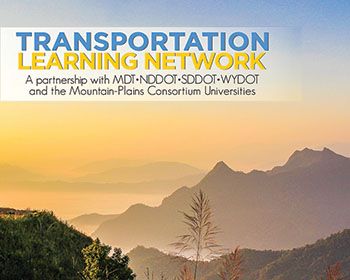Upper Great Plains Transportation Institute's TLN is Gateway to On-The-Job Transportation Education
Posted: Mar 2, 2023
 Building and maintaining the best and safest transportation system with the dollars available is the goal of every transportation agency in North Dakota, from the ND Department of Transportation to local county road departments, tribal reservations, and cities. The Transportation Learning Network (TLN), a program within the Upper Great Plains Transportation Institute at North Dakota State University, trains workers in those agencies to do just that.
Building and maintaining the best and safest transportation system with the dollars available is the goal of every transportation agency in North Dakota, from the ND Department of Transportation to local county road departments, tribal reservations, and cities. The Transportation Learning Network (TLN), a program within the Upper Great Plains Transportation Institute at North Dakota State University, trains workers in those agencies to do just that.
From October to May each year, TLN offers dozens of virtual training opportunities to any transportation worker in North Dakota as well as Montana, South Dakota, and Wyoming. Topics include equipment operation, maintenance and repair techniques, ethics, communication skills, management skills, and many others.
"Our clients run the gamut from entry-level employees, including office staff, technicians, and operators, to road or section supervisors and even county commissioners," said Chris Padilla, TLN's director. "Anyone within the four states we serve who works on behalf of a public sector transportation agency is eligible to participate. That includes contractors and consulting engineers."
So far this year, 466 individuals from North Dakota have participated in TLN learning opportunities. Of those, 260 were non-DOT employees.
TLN has its roots in sharing new technology and innovative techniques. In the 1980s, North Dakota State University and its Upper Great Plains Transportation Institute led a new multi-state group of universities, the Mountain-Plains Consortium (MPC), competitively selected and funded by the US Department of Transportation to conduct transportation research in the region. In the 1990s, the MPC created an innovative video network to share research results and to enhance collaboration among transportation practitioners and workers. Today, the eight MPC universities—NDSU, South Dakota State University, the University of Wyoming, Colorado State University, the University of Colorado Denver, the University of Denver, the University of Utah, and Utah State University—continue to share research results via the TLN.
Today, however, TLN's focus has shifted to tapping university and private-sector expertise to provide presentations that address key issues for transportation workers across the region. Padilla and his staff work closely with departments of transportation in the region to identify topics of critical interest. They survey clients in the states to identify topics. Each live training event concludes with a chance for participants to offer feedback and topic suggestions. Email surveys of participants also help identify possible presentations. Padilla and his staff refine the list in consultation with leadership within each department of transportation.
"Our content is very much driven by our audience," he said. "We listen closely to that customer feedback." As an example, he notes that an "Introduction to Project Management" presentation last year generated numerous comments seeking a more in-depth exploration of the content. This year, project management is covered in a six-part series.
Once a topic has been identified, TLN staff work to identify a subject matter expert. "Typically, we look for an expert within our region," Padilla said. "Those people typically have the experience with our climate, our traffic, and our roads and that experience resonates with our audience."
Most often, clients participate individually via desktop, laptop, tablet, or phone. But it's also common for individuals to gather in a common place to view a recorded or live event. In New Town, for instance, staff from the city, county, and the Fort Berthold Indian Reservation will often gather in a conference or meeting room to participate together. "The advantage is that they're interacting with each other as well as with the content and the presenter," Padilla said.
A considerable amount of the training helps agencies meet requirements imposed by federal agencies and licensing agencies. TLN's work zone safety presentations meet requirements from USDOT as outlined in the Code of Federal Regulations. Civil rights training is required by numerous agencies. Annual ethics training is required by the North Dakota State Board of Registration for Professional Engineers and Land Surveyors.
"Many of our local agencies and contractors don't have access to that kind of training or it's prohibitively expensive for them to send employees to attend an in-person class where only 30 people at a time can attend," Padilla said. "Operating in the virtual environment allows us to open up the gates and allow people to attend who wouldn't normally have that opportunity."
TLN stores its presentations in an exclusive learning management system that gives clients on-demand access to educational opportunities and allows them to track their progress and easily document professional development hours.Ultimately, TLN is an investment in the region's transportation workforce. "Every one of our clients wants better, safer, longer-lasting roads," Padilla said. "They want to use the best available technology and techniques and they want to be good stewards of the public's resources. Our educational opportunities equip them and empower them to do that."
Learn more by visiting the TLN webiste.